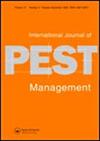A comprehensive review on integrated pest management of melon fruit fly ( Bactrocera cucurbitae)
IF 1.1
4区 农林科学
Q3 ENTOMOLOGY
引用次数: 0
Abstract
AbstractThe haphazard and irrational use of chemical pesticides has led to pest resurgence and pesticide resistance, posing a significant challenge in the management of economically important pests. Farming systems built on integrated pest management (IPM) can minimize the use of chemical pesticides and secure soil, plant, and human health by controlling pests at the same time. Bactrocera cucurbitae is a serious pest of cucurbitaceous crops including more than other 70 hosts. Though various control strategies have been developed against melon fruit flies, fewer efforts have been paid to establish effective and efficient integrated pest management programs. This review provides an overview of the life cycle and behaviour of melon fruit fly as well as a detailed analysis of the various IPM strategies that have been developed for their control. These strategies include cultural practices, such as weeding, removal of alternate hosts, and field sanitation, biological control methods such as use of natural enemies, and entomopathogenic fungi (Beauveria bassiana, B. pseudobassiana), use of botanicals (neem, jholmol), and chemical control measures, such as the use of pesticides.Keywords: Bactrocera cucurbitaeIPMcontrolyield lossmanagement AcknowledgmentsWe would like to thank our parents, friends, and professors from Agriculture and Forestry University who helped directly and indirectly during the process of manuscript preparation.Authors’ contributionsPramod Gyawali analysed the data and prepared the manuscript. All other co- authors critically reviewed the manuscript and the final version was accepted by all the co-authors for publication.Disclosure statementThe co-authors declare that there is no conflict of interest regarding the publication of this manuscript.瓜类果蝇(Bactrocera cucurbitae)害虫综合治理研究综述
摘要化学农药的随意和不合理使用导致害虫死灰复燃和抗药性,对重要经济害虫的治理提出了重大挑战。建立在病虫害综合管理(IPM)基础上的农业系统可以最大限度地减少化学农药的使用,同时通过控制病虫害来保护土壤、植物和人类健康。葫芦小实蝇是葫芦科作物的严重害虫,有70多种寄主。尽管人们已经开发出各种防治瓜类果蝇的策略,但建立有效和高效的害虫综合治理方案的努力却很少。本文综述了甜瓜果蝇的生命周期和行为,并详细分析了各种防治策略。这些策略包括培养方法,如除草、去除交替寄主和现场卫生,生物控制方法,如使用天敌和昆虫病原真菌(白僵菌、假球孢白僵菌),使用植物药物(印楝、苦艾草),以及化学控制措施,如使用杀虫剂。感谢我们的父母、朋友和农林大学的教授,他们在稿件的准备过程中给予了直接或间接的帮助。作者的贡献:spramod Gyawali分析了数据并准备了手稿。所有其他共同作者都对手稿进行了严格的审查,最终版本被所有共同作者接受出版。公开声明共同作者声明本论文的发表不存在利益冲突。
本文章由计算机程序翻译,如有差异,请以英文原文为准。
求助全文
约1分钟内获得全文
求助全文
来源期刊
CiteScore
4.70
自引率
6.70%
发文量
74
审稿时长
>12 weeks
期刊介绍:
International Journal of Pest Management publishes original research papers and reviews concerned with pest management in the broad sense, covering the control of pests (invertebrates, vertebrates and weeds) and diseases of plants, fungi and their products – including biological control, varietal and cultural control, chemical controland interference methods.
The management of invasive species is of special interest. We also encourage submissions dealing with interactions of multiple pests such as arthropods and plant pathogens, pathogens and weeds or weeds and arthropods as well as those dealing with the indirect and direct effects of climate change on sustainable agricultural practices.

 求助内容:
求助内容: 应助结果提醒方式:
应助结果提醒方式:


